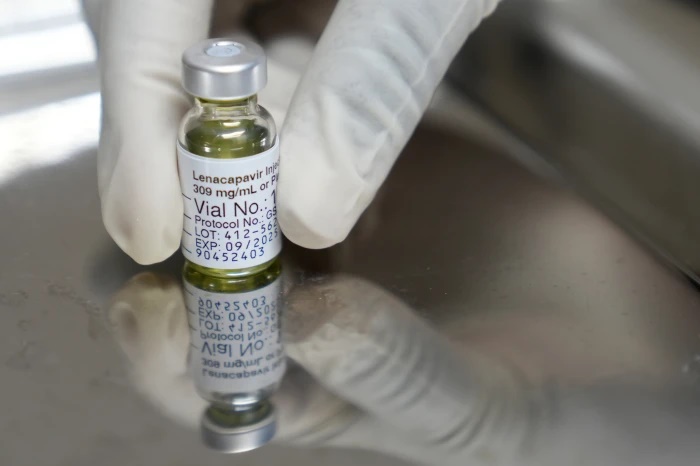Twice-yearly shots used to treat AIDS were 100% effective in preventing new infections in women, according to study results published Wednesday.
There were no infections in the young women and girls that got the shots in a study of about 5,000 in South Africa and Uganda, researchers reported. In a group given daily prevention pills, roughly 2% ended up catching HIV from infected sex partners.
“To see this level of protection is stunning,” said Salim Abdool Karim of the injections. He is director of an AIDS research center in Durban, South Africa, who was not part of the research.
The shots made by U.S. drugmaker Gilead and sold as Sunlenca are approved in the U.S., Canada, Europe and elsewhere, but only as a treatment for HIV. The company said it is waiting for results of testing in men before seeking permission to use it to protect against infection.
The results in women were published Wednesday in the New England Journal of Medicine and discussed at an AIDS conference in Munich. Gilead paid for the study and some of the researchers are company employees. Because of the surprisingly encouraging results, the study was stopped early and all participants were offered the shots, also known as lenacapavir.
While there are other ways to prevent HIV infection, like condoms or daily pills, consistent use has been a problem in Africa. In the new study, only about 30% of participants given Gilead’s Truvada or Descovy prevention pills actually took them — and that figure dropped over time.
The prospect of a twice-a-year shot is “quite revolutionary news” for our patients, said Thandeka Nkosi, who helped run the Gilead research at the Desmond Tutu Health Foundation in Masiphumelele, South Africa. “It gives participants a choice and it just eliminates the whole stigma around taking pills” to prevent HIV.
Experts working to stop the spread of AIDS are excited about the Sunlenca shots but are concerned Gilead hasn’t yet agreed on an affordable price for those who need them the most. The company said it would pursue a “voluntary licensing program,” suggesting that only a select number of generic producers would be allowed to make them.
Another HIV prevention shot, Apretude, which is given every two months, is approved in some countries, including in Africa. It sells for about $180 per patient per year, which is still too pricey for most developing countries.
Byanyima said the people who need long-lasting protection the most include women and girls who are victims of domestic violence and gay men in countries where same-sex relationships are criminalized. According to UNAIDS, 46% of new HIV infections globally in 2022 were in women and girls, who were three times more likely to get HIV than males in Africa.
Byanyima compared the news about Sunlenca to the discovery decades ago of AIDS drugs that could turn HIV infection from a death sentence into a chronic illness. Back then, South African President Nelson Mandela suspended patents to allow wider access to the drugs; the price later dropped from about $10,000 per patient per year to about $50.
Olwethu Kemele, a health worker at the Desmond Tutu Health Foundation, predicted the shots could boost the number of people coming in for HIV prevention and slow the virus’ spread. She said young women often hide the pills to avoid questions from boyfriends and family members. “It makes it hard for the girls to continue,” she said.
In a report on the state of the global epidemic released this week, UNAIDS said that fewer people were infected with HIV in 2023 than at any point since the late 1980s. Globally, HIV infects about 1.3 million people every year and kills more than 600,000, mainly in Africa. While significant progress has been made in Africa, HIV infections are rising in Eastern Europe, Latin America and the Middle East.
